Feature
Klarman Hall showcases humanities for a new century
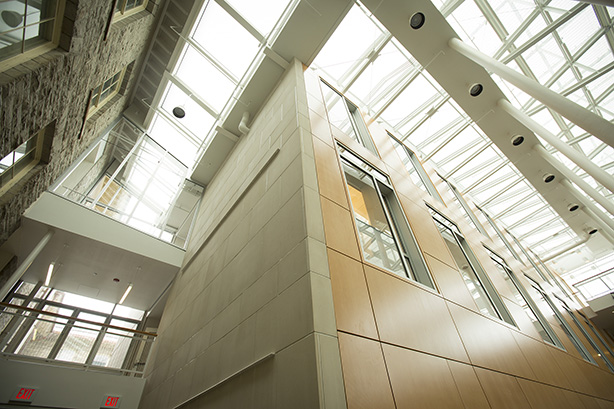
Looking up from the Groos Family Atrium in Klarman Hall.
Klarman Hall's newly opened corridors and offices hum with activity and so does its glass-domed Groos Family Atrium, where students and faculty meet, study and enjoy the light-filled space.
That the humanities are thriving at Cornell is evident in every square foot of the new building, the first on campus dedicated to the humanities in more than 100 years. During that century, the humanities faculty in the College of Arts and Sciences has grown from 30 members to well over 200, an increase of more than 700 percent. These humanists are leaders in their fields, engaged in exciting, forward-looking research that bridges disciplines and reaches across the university.
With some 33,250 square feet of usable space, Klarman Hall serves as a hub for the entire college, with its large auditorium available for classes and lectures across the arts, humanities and sciences. The building also brings together all literature departments under one roof, enhancing opportunities for collaboration.
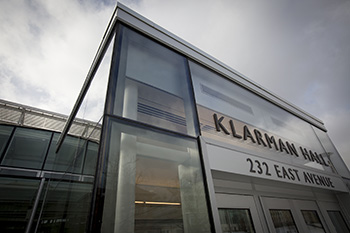
Klarman Hall opened in January and is already a hub of activity. The building includes 124 offices and conference rooms and the light-filled Groos Family Atrium, which includes lots of seating space and a caf. See larger image
"The grand challenges we face in the 21st century are all fundamentally human in nature and require the perspective of humanists to solve," says Gretchen Ritter '83, the Harold Tanner Dean of Arts and Sciences. "Klarman Hall is a physical manifestation of the college's commitment to humanities scholarship and its ability to help citizens, communities and public leaders address our most pressing challenges and opportunities."
Studying capitalism
The college's new History of Capitalism initiative, in partnership with the ILR School, is one example of cross-disciplinary research and collaboration, with faculty participants from Arts and Sciences departments as well as from ILR and the College of Human Ecology. Plans for the initiative include conferences, workshops, a speaker series, digital archives, reading groups and a proposed minor.
"It's a perfect topic to bring people together," says Larry Glickman, professor of history and project lead. "Everyone needs a job and needs a country wealthy enough to fulfill this need. And the current presidential campaign, with a democratic socialist running, gives the study of capitalism an immediate relevance."
Kwelina Thompson, a first-year graduate student studying the history of capitalism, has an undergraduate economics degree. "There's a way to look at social mobility with economic tools, and they're absolutely rigorous and I think they tell a compelling story," she says. "But there's also a way to look at it by taking a historian's lens to it. Studying the history of capitalism gets you to think about the questions in a different way."
The History of Capitalism project's reach is intentionally broad, addressing questions such as the nature of capitalism and its relationship with democracy and other forms of politics and its effects on law, social mobility, inequality and the environment.
"Many of our students are deeply interested in applying history to issues of social concern. This project connects historical scholarship with students' lives and engagement," Glickman says.
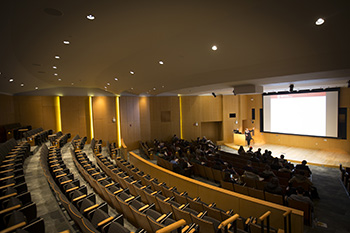
Klarman Hall's 330-seat auditorium is the largest on the Arts Quad. See larger image
History professors Victor Seow and Sandra Greene and ILR economist George Boyer add a global perspective to the project, with Seow's research on China, Greene's focus on West Africa and Boyer's emphasis on Europe, while history professor Edward Baptist offers expertise on the history of American capitalism. With ILR professor Louis Hyman, Baptist teaches a popular course on the subject.
Hyman also runs a History of Capitalism "boot camp" in the summer, which has drawn graduate students and faculty from across the country to learn economic basics.
Baptist's current project, Freedom on the Move, examines American slaves' resistance to the expanding capitalist system in the 19th-century South. With a digital humanities grant from the National Endowment for the Humanities and in collaboration with Cornell University Library, the Cornell Institute for Social and Economic Research and other scholars, he's building a database of runaway slave ads in the U.S., which provide the best approximation possible of an American slave census.
The database is designed as a teaching tool, with much of the analysis done through crowdsourcing by students who engage with primary sources and learn to deal digitally with large numbers of historical documents.
The History of Capitalism project addresses other pressing topics such as inequality. "One of the big abiding issues in the history of capitalism is that capitalist expansion has often been accompanied by deepening inequality and declining freedom," Baptist says. "What can history teach us about how to shape economic growth while also ensuring economic democracy and opportunity?"
Addressing inequality
Inequality – economic and racial – is a focus for Cornell humanists today; their thinking offers historical depth and adds diverse perspectives to the discussion. This spring, the Ethics and Public Life (EPL) program is hosting a six-part series of lectures and workshops addressing aspects of inequality, from political influence to education to persistent poverty.
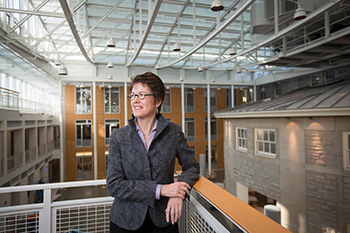
Gretchen Ritter '83, the Harold Tanner Dean of Arts and Sciences, in Klarman Hall. See larger image
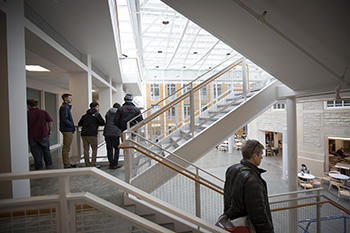
Stairway visible in Klarman Hall's Groos Family Atrium. See larger image
"Inequality has grown in the U.S., and the facts have people alarmed," says Richard Miller, professor of philosophy and director of EPL. "But why should we care about comparisons of income or political influence? By addressing such questions, philosophy helps people to think through what their moral standards are. Discussing questions of why we should care can help people understand others' points of view and talk across political divides."
Humanities classes are important forums for these discussions because questions of values are explicit, says Miller. "For example, is the American way of life worthy of love? If not, how can you nurture it so it becomes worthy of love?"
The College of Arts and Sciences' Center for the Study of Inequality, devoted to understanding patterns, causes and consequences of social and economic inequality, brings humanists and social scientists together. Other faculty members, such as those in the Department of English, also are engaged with inequality studies, examining topics like the impact of social and cultural differences on educational achievements and the cultural and economic challenges Native Americans face. In the Department of German Studies, professors look at society's strengths and weaknesses through philosophers such as Marx and Kant.
The humanities "give people crystallizing concepts that reveal what would otherwise be invisible and unmask social structures that we wouldn't otherwise see," says Kate Manne, assistant professor of philosophy, whose research focuses on inequalities arising from gender. Her current book project is "Down Girl: How Misogyny Upholds Male Dominance."
"A really common trope in public discourse is that misogyny occurs because women are seen as less human. I think that's wrong," says Manne. "Misogyny occurs because of women's subordinate social position and men's dominant role."
Manne analyzes racism similarly. "Dehumanization increasingly seems to me to be merely a symptom of the problem," she wrote in an op-ed in The New York Times, "the problem being precisely that black people are being seen as people – and they are seen as being threatening, and taken down, because of it."
Engaging with race
As issues of race have exploded into the national consciousness, the Africana Studies and Research Center has provided a place for scholarship and community discussions on ethical issues of racism and social justice.
"There has to be a connection, between what is done in the classroom and what we're studying as scholars, with what is happening in our world and the experiences we have as people," says Noelani Gabriel '16, an Africana studies major and participant in one of Africana's public forums on Ferguson, Missouri, held in 2014.
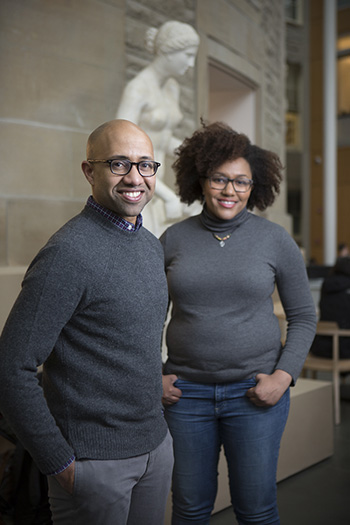
Russell Rickford, assistant professor of history, with Noelani Gabriel '16, an Africana studies major, in Klarman Hall. See larger image
Gabriel says her classes have taught her to look at issues with a critical eye and helped to illuminate the way issues have taken shape in texts over time. She's writing her senior thesis on how race and gender interact with mental health issues and services for black women at Cornell. "We all come to Cornell with a different set of circumstances, beliefs and perspectives, and it's important to understand this intersectionality from a policy level, which will lead to greater equality in resources and support," she explains.
Assistant professor of history Russell Rickford says it's not a foregone conclusion that people will be motivated to think critically about society and the possibilities for social change. "Students have to wrestle with these concepts or they'll take their own experiences for granted and think their reality is the only reality. They won't realize how they are products of a complex set of forces."
Because every Cornell student takes classes in the College of Arts and Sciences, they are exposed to vastly different backgrounds and perspectives. Africana professor Oneka LaBennett has seen the importance of this in her classes, such as Representing Brooklyn: Race, Place and Popular Culture.
"I've had students of color from Brooklyn who are deeply critical of gentrification, and students from other parts of the country who want to move to Brooklyn and who may themselves become gentrifiers, debating issues of inequality," she says.
Art created by history of art associate professor Iftikhar Dadi, in collaboration with Elizabeth Dadi, also addresses complex societal issues. A recent exhibit of their art in Mumbai, India, included works from the series "Efflorescence," inspired by the national flowers of countries experiencing or that have experienced border disputes and problems.
"Contemporary art doesn't give you solutions," says Iftikhar Dadi. "It makes you think in more complex, less instrumental ways and identifies things to which you should be attentive."
Some Cornell humanists tackle inequality issues made worse by climate change. Assistant professor of history Mostafa Minawi, the Himan Brown Sesquicentennial Faculty Fellow and director of the Ottoman and Turkish Studies Initiative (OTSI), notes there are 60 million displaced people in the world. OTSI recently co-hosted Beyond Survival, a conference on increasing job and educational opportunities for refugees in the Middle East and the Mediterranean basin, a situation made more difficult by drought in the area.
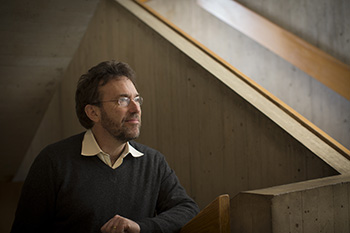
Larry Glickman, professor of history. See larger image
"Climate is a threat multiplier," says María Cristina García, the Howard A. Newman Professor of American Studies, who's writing a book on climate refugees. "Many of the political upheavals of the last 40 years have an environmental component that contributed to dislocation. It has a cascading effect. We need to figure out how to respond to populations that are most at risk as a result of climate change."
Tackling environmental issues
Romance studies and comparative literature professor Karen Pinkus was one of four Cornell professors selected to attend the December 2015 Paris COP21 climate change negotiations. The perspective of humanists is critical, she says, to solving complex problems posed by climate change.
"While big data studies and computer modeling can tell us something quantitatively, they don't really give us a sense of what we might be facing as humans," she explains. "Being able to have a historical perspective informed by scholarship gives us the perspective to think creatively about the future as well."
Cultural studies, too, are crucial to solving environmental problems by looking at how narratives of climate change drive what people believe and the policies they implement.
"We're talking about particular power differentials and which stories get told and which stories get talked about; how people might identify with a story which would impact greatly the future of political action, policy and even research and development," says Anindita Banerjee, associate professor of comparative literature.
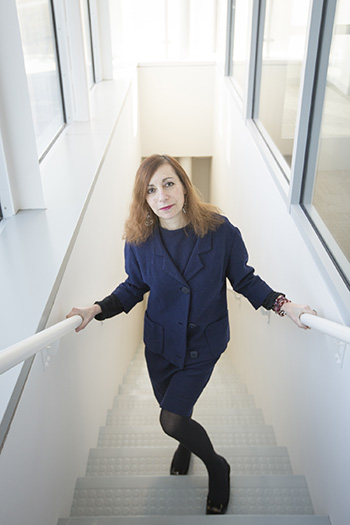
Karen Pinkus, professor of Romance studies and comparative literature. See larger image
"The energy industry got the importance of telling stories a lot earlier than the environmental movement," Banerjee adds. "'Scenarios' are a very active part of how energy corporations have been managing their presence in public life."
Since humanists deal with stories, their perspective is critical in understanding the narratives on all sides of the issue. In Pinkus' new book, "Fuel," she argues for the separation of fuel (potential) from energy (power), engaging with literature, art and critical theory to think beyond fossil fuels to the bigger picture.
Banerjee's upcoming book, "Fuel Fictions, Art & Energy in Modern Russia," explores the complex relationship between energy and art in Russia today. In the fall, she received a fellowship from the Atkinson Center for a Sustainable Future that enabled her to engage in conversations with engineers, social scientists and business experts. That led to a conference she organized, hosted by the Atkinson Center. Oil and the Human: Views From the East and South addressed the human dynamics of energy societies in Africa, Latin America and Russia.
"Complex environmental issues can best be understood through familiarity with diverse perspectives – including those of the humanities, arts, social sciences, natural sciences, physical sciences and every other kind of science," notes environmental historian Aaron Sachs. He founded the Cornell Roundtable on Environmental Studies Topics (CREST), which has members from 20 departments on campus, to foster communication and collaboration across disciplines.
Sachs says that as we struggle with the overwhelming nature of 21st-century problems, remembering the power of retrospection is important. "While no one can predict the future, the past offers lessons, not just from its calamities but from previous good ideas – like incorporating green space into our everyday habitations."
The value of such research for education is immeasurable, says Ritter. "Our students are learning for life. Having the chance to ask the big questions of the past and present gives them the tools to change the future."
|
Society for the Humanities celebrates 50th anniversary For the past 50 years, the Society for the Humanities has fostered path-breaking scholarship, sponsoring and hosting hundreds of projects, conferences and workshops for faculty and graduate students each year. "The Society for the Humanities, like the College of Arts and Sciences itself, sits at the nexus of the interdisciplinary dialogue and theoretical reflection that are the humanities," says Gretchen Ritter '83, the Harold Tanner Dean of Arts and Sciences. "This 50th anniversary is an ideal time to celebrate its important work at Cornell." Each year, the society brings together distinguished visiting fellows and Cornell faculty and graduate student fellows to pursue research on a broadly interdisciplinary focal theme. This year's theme is "Time," chosen to mark Cornell's recent sesquicentennial and the society's anniversary. In her Digital Futures project, faculty fellow Arnika I. Fuhrmann, assistant professor of Asian studies, is investigating the ways in which the temporal properties of digital media expand the dynamics of the political climate in Southeast and East Asia. The book project of faculty fellow Annetta Alexandridis, associate professor of history of art and classics, originates in her work as co-curator of Cornell's plaster cast collection, and is the story of such collections from a postcolonial, global perspective. "The society has been crucial to work in the humanities on campus, which is why it is housed in the president's house [the A.D. White House] at the symbolic core of Cornell," says Timothy Murray, the Taylor Family Director of the Society for the Humanities and professor of comparative literature and English. As the first residential humanities research center in the world, the society has provided the national and international template for the role of humanities centers within universities, says Murray, as well as catalyzing important initiatives such as the Central New York Humanities Corridor and the international Consortium of Humanities Centers and Institutes. |